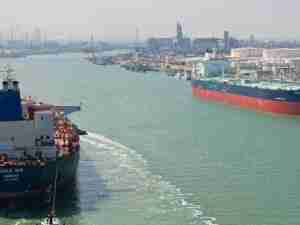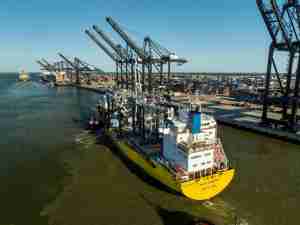New Delhi plans to create a state-owned firm, India Ports Global, dedicated to investing in ports overseas as it looks to catch up with rival China in securing global supply chains -- from mines and railways to ports and ships.
India's aim to spread its influence beyond its shores and lock in much needed coal, crude oil and other commodities could limit the amount of funding available to modernize and expand its domestic ports.
"At the moment, Indian ports suffer major congestion that is impeding trade and affecting its economy," said Neil Davidson, a leading port expert at Drewry consultants.
"My concern is that this international expansion plan could distract them from making the necessary investment and improvements in Indian ports."
Infrastructure woes such as congestion at ports and roads in the world's second most populous nation shave an estimated 1-2 percentage points off the country's GDP growth, according to the finance ministry, as construction has failed to keep pace with India's rapid economic expansion.
New Delhi wants to raise at least 70 billion rupees ($1.5 billion) this fiscal year as initial funding for India Ports Global, Shipping Secretary K. Mohandas told Reuters.
Around $453 million will come from at least three of the country's 13 major state-run ports, reducing reserves that could be used to fund their own domestic expansion plans.
Proposed government funding for India Ports Global is not that much less than what New Delhi has budgeted for port projects at home.
India's government has earmarked $12.2 billion for domestic port projects over the next six years, or about $2 billion on an annual basis. New Delhi wants the bulk of funding to come from the issuing of tax-free bonds and private investors.
The government, which has ambitiously set the end of this year for Indian Ports Global to begin operating, denied the firm would come at the expense of its own domestic ports.
"We have a definite plan for Indian ports and we are going ahead with that plan," Mohandas said. "This is definitely not at the cost of Indian ports."
Several details of the new company, including who will manage it and how investment projects will be picked, still need to be worked out and industry officials expect some delays -- especially with New Delhi busy grappling with corruption scandals and high inflation.
"It's a good idea, but India is not like China where an idea becomes a reality overnight. Things need to be debated and that takes time," said a senior India port executive, who wished not to be named.
Infrastructure Link
One of the main aims for India Ports Global will be to invest in tandem with other state-owned companies making forays overseas, providing the infrastructure link to their projects.
Coal India, India's Oil and Natural Gas Corp , Steel Authority of India , and others are spending heavily in Southeast Asia, Australia and Africa to secure the natural resources needed to fuel India's expanding economy.
"If we want to continue to be a growing economy, we need to think longer term about our supply lines," said Anil Devli, chief executive of India Shipowners Association.
"We need to have a strategy to make sure we have certain interests at certain ports. We should be looking at Indonesia, Australia, Vietnam and Africa since we have lots of investment there already."
The Indian company, however, will face fierce competition from not only Chinese competitors but also industry leaders PSA International, Singapore-listed Hutchison Port Holdings and Dubai's DP World .
"If you want to play the international game, you have to have the money to invest and prospect. You cannot do this half heartedly and there are many risks involved," said Drewry's Davidson.
Balancing Act
Whether India, a country plagued with endemic corrup










